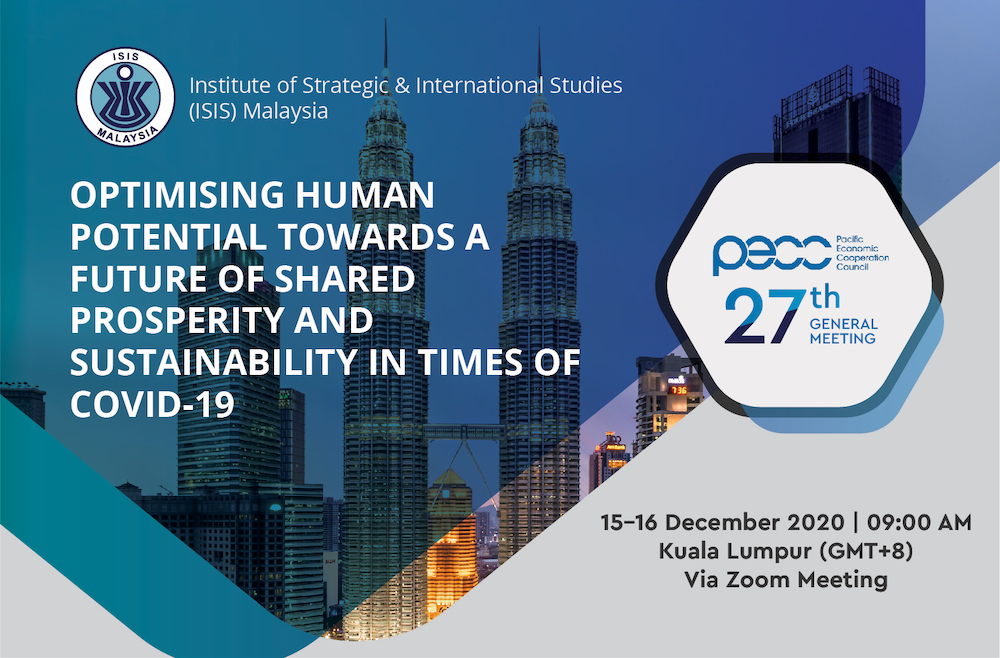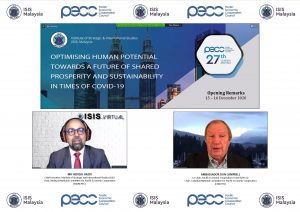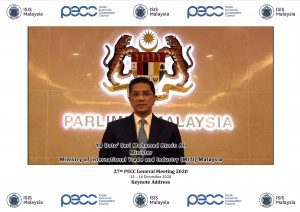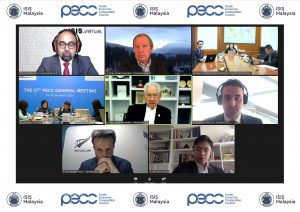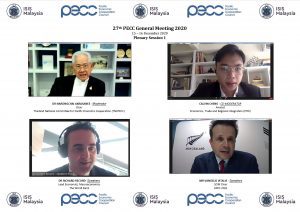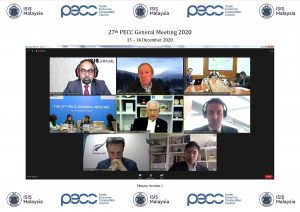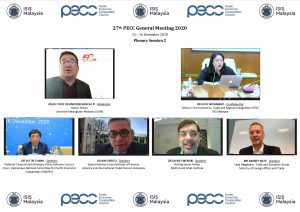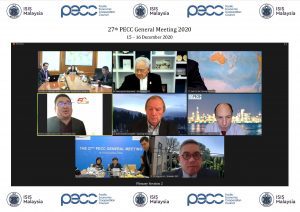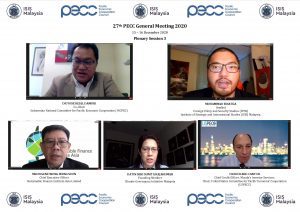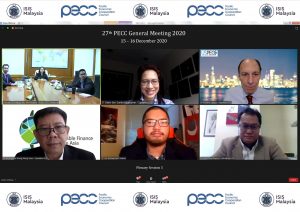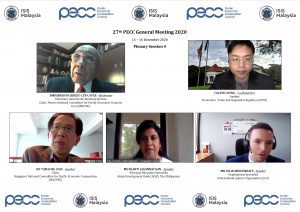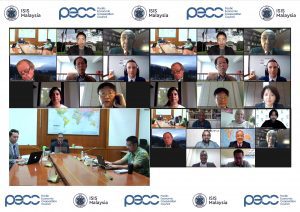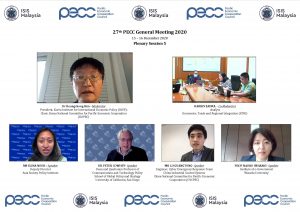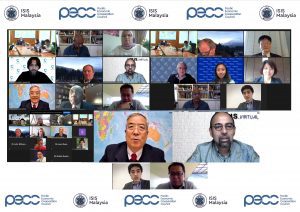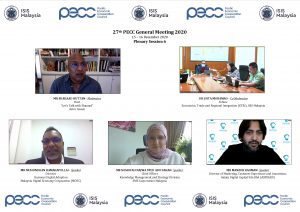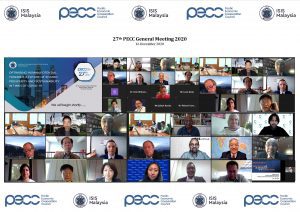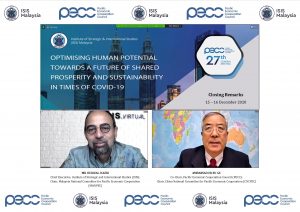The 27th PECC General Meeting
Optimising Human Potential Towards a Future of Shared Prosperity
and Sustainability in Times of Covid-19
The 27th PECC General Meeting will be hosted by the Institute of Strategic and International Studies (ISIS) Malaysia. The overarching theme will be: Optimising Human Potential Towards a Future of Shared Prosperity and Sustainability in Times of COVID-19. The conference will take place over 2 days consisting of plenary panel discussions on topics related to the theme. At the height of uncertainties in the global economy, namely rising trade tensions and the spread of the COVID-19, APEC economies need to address these challenges so that benefits from trade, investments and economic cooperation are enjoyed by its people even at the grassroots level. The General Meeting will bring together a diverse range of experts, thinkers and practitioners from academia, government and businesses from the region and beyond, to examine current issues related to trade, investments and sustainability by using the APEC 2020 priority areas listed above. Recommendations on the responses needed by regional economies, regional institutions and the private sector will be explored in the panel discussions.
Tuesday, 15 December 2020
9:00 - 9:10 : Opening Remarks
 Mr Herizal Hazri
Mr Herizal Hazri
Chief Executive, Institute of Strategic and International Studies (ISIS);
Chair, Malaysia National Committee for Pacific Economic Cooperation
(MANCPEC)
Opening Remarks Ambassador Don Campbell
Ambassador Don Campbell
Co-Chair, Pacific Economic Cooperation Council (PECC);
Chair, Canadian National Committee for Pacific Economic Cooperation
(CANCPEC)
9:10 - 9:30 : Keynote Address: Malaysia and Trade Reforms in Uncertain Times
 YB Dato’ Seri Mohamed Azmin Ali
YB Dato’ Seri Mohamed Azmin Ali
Minister
Ministry of International Trade and Industry (MITI)
Malaysia
9:30 - 10:30 : Plenary Session 1
Economic Repercussions of the COVID-19 Crisis
Over the past couple of years, numerous global hazards have threatened to hamper the growth of international trade and the proliferation of global value chains. These include the rise of trade protectionism, the resultant multi-sided trade tensions and, more recently, the COVID-19 pandemic. With many economies in the region heavily dependent on trade and deeply integrated into global supply chains, these disruptive shocks have large negative impacts on economic activity in the region. Amid this backdrop of recurring systemic risks to global trade, how should APEC member economies respond in the coming decade? What role can APEC play as an institution in mitigating the downsides of these risks and safeguarding international trade and global supply chain activity?
Moderator
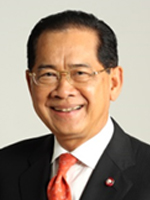 Dr Narongchai Akrasanee
Dr Narongchai Akrasanee
Chair
Thailand National Committee for Pacific Economic Cooperation (TNCPECC)
Speakers
 Mr Vangelis Vitalis
Mr Vangelis Vitalis
SOM Chair
APEC 2021 Dr Richard Record
Dr Richard Record
Lead Economist
Macroeconomics
The World Bank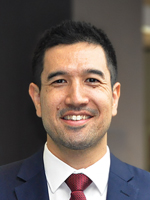 Mr Shiro Armstrong
Mr Shiro Armstrong
Director
East Asian Bureau of Economic Research
The Australian National University (ANU)
10:35 - 11:35 : Plenary Session 2
Initial Assessment of the CPTPP and the Future of RCEP – How are Member Economies Faring to Date Especially in Times of COVID-19?
After more than two years since the signing of CPTPP, only seven members have successfully ratified the agreement. It entered into force on 30 December 2018 after Mexico, Japan, Singapore, Australia, New Zealand, and Canada became the first six economies to ratify the agreement. In January 2019, Vietnam became the latest ratified member of the CPTPP. What are, if any, initial benefits reaped by these seven economies? How has CPTPP impacted their GDP, exports and employment in different tradable sectors especially during the pandemic pre-pandemic times? With rising trade tensions and the virus still unable to be contained, what can member economies of RCEP learn from the CPTPP agreement?
Moderator
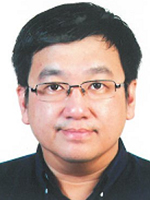 Assoc Prof Dr Andrew Kam Jia Yi
Assoc Prof Dr Andrew Kam Jia Yi
Senior Fellow
Universiti Kebangsaan Malaysia (UKM)
Speakers
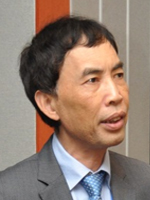 Dr Vo Tri Thanh
Dr Vo Tri Thanh
National Financial and Monetary Policy Advisory Council;
Chair; Vietnamese National Committee for Pacific Economic Cooperation
(VNCPEC)
Presentation slides Dr Kiki Verico
Dr Kiki Verico
Special Advisor to the Minister of Finance
Industry and International Trade Division Indonesia
Presentation slides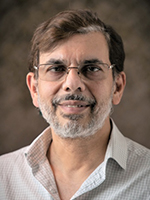 Dr Jayant Menon
Dr Jayant Menon
Visiting Senior Fellow
ISEAS-Yusof Ishak Institute
Presentation slides Mr Barney Riley
Mr Barney Riley
Lead Negotiator, Trade and Economic Group
Ministry of Foreign Affairs and Trade
11:40 - 12:40 - Plenary Session 3
Accelerating Solutions to Climate Change – Can Markets Transition to a Low Carbon Economy?
With environmental risks such as climate change being recognised as significant threats to the business scene, companies need to respond and revamp their business models to adapt to the changes. Among the key risks posed by climate change are extreme weather events and natural catastrophes that will disrupt business activities as well as resource supplies. Furthermore, “transition risks” in shifting towards a low carbon economy, in the form of price fluctuations (ie. in changes of demand for fossil fuels) and policy changes may impact on business operations. Some businesses have successfully incorporated a new philosophy with innovative business models and gained market share as well as traction in popularity. This session explores how businesses and the market can transition to a low carbon economy by discussing existing and potential solutions.
Moderator
 Dr Yose Rizal Damuri
Dr Yose Rizal Damuri
Co-Chair
Indonesian National Committee for Pacific Economic Cooperation (INCPEC)
Speakers
 Dr Richard Cantor
Dr Richard Cantor
Chief Credit Officer, Moody’s Investor Services;
Chair, United States Committee for Pacific Economic Cooperation (USPECC) Datin Seri Sunita Rajakumar
Datin Seri Sunita Rajakumar
Founding Member
Climate Governance Initiative Malaysia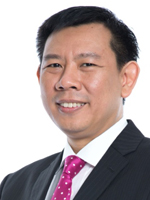 Mr Eugene Wong Weng Soon
Mr Eugene Wong Weng Soon
Chief Executive Officer
Sustainable Finance Institute Asia Limited
Photo Gallery (Day 1)
Wednesday, 16 December 2020
9:00 - 10:00 : Plenary Session 4
Youth and Jobless – Facing Youth Unemployment in the Asia Pacific
As governments in the region increasingly acknowledging the adverse effects that elevate youth unemployment, policy issues including graduate employability as well as technical and vocational training (TVET) have come to the forefront. At the same time, trends such as rapid technological change, the rise of gig economy and the spread of COVID-19 threaten to change the landscape of youth and graduate employment. How can economies in the Pacific improve labour outcomes for the youth? How should governments support youth skills development and adequately prepare them for the future of work and non-work challenges so that they remain resilient?
Moderator
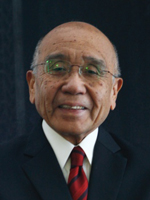 Ambassador Sergio Ley-Lopez
Ambassador Sergio Ley-Lopez
Chairman, Asia-Pacific Business Section;
Chair, Mexico National Committee for Pacific Economic Cooperation (MXCPEC)
Speakers
 Dr Tan Khee Giap
Dr Tan Khee Giap
Chair
Singapore National Committee for Pacific Economic Cooperation (SINCPEC)
Presentation slides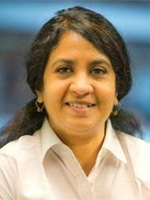 Ms Shanti Jagannathan
Ms Shanti Jagannathan
Principal Education Specialist
Asian Development Bank (ADB), The Philippines Mr Felix Weidenkaff
Mr Felix Weidenkaff
Employment Specialist
International Labour Organization (ILO)
Presentation slides
10:05 - 11:05 : Plenary Session 5
Digital Economy and its Infrastructure for an Inclusive Society
The prospects of digital economy have several considerations. One is the race for its enhancement, where economies aim to secure resources, invest in infrastructure and participate in discourse on rules and regulations. Another is the status quo of business that cannot be sustained due to new innovations tested and pushed into the marketplace, which inevitably shape how we interact with one another. Discussions on harnessing the possibilities of digital economies include those that harmonise digital value chains, develop digital single markets and promote inclusive growth among the population. What are the key issues of and challenges to growing digital economy in the direction of shared prosperity? Would the digital economy create a new North-South divide or can it help to bridge the gap in the long-run? How should governments tackle the issue of inclusive growth and what are the cost implications for these efforts?
Moderator
 Dr Heungchong Kim
Dr Heungchong Kim
President, Korea Institute for International Economic Policy (KIEP);
Chair, Korea National Committee for Pacific Economic Cooperation (KOPEC)
Speakers
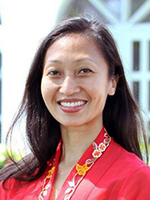 Ms Elina Noor
Ms Elina Noor
Deputy Director
Asia Society Policy Institute Dr Peter Cowhey
Dr Peter Cowhey
Dean and Qualcomm Professor of Communication and Technology Policy
School of Global Policy and Strategy
University of California, San Diego Prof Naoko Iwasaki
Prof Naoko Iwasaki
Institute of e-Government
Waseda University Mr Lu Guangtong
Mr Lu Guangtong
Engineer, Cyber Emergency Response Team
China Industrial Control System;
China National Committee for Pacific Economic Cooperation (CNCPEC)
11:10 - 12:10 : Plenary Session 6
SMEs in Driving Innovation in the New Digital Age
Over the past few decades, Malaysia has transitioned from agricultural-based to industry-based economy. Almost 99 percent of the Malaysian economy consists of SMEs, where they provide 66 percent of the economy’s employment, although contribution to the economy’s GDP is merely 38.3 percent. It is evident that leveraging on SME’s growth is essential for Malaysia and its trade partners, so that they become innovation-led nations that ensure that sustainable economic growth and shared prosperity can be achieved. Despite investments and other initiatives to uplift SMEs and innovation in the economy, the outcome is yet to be satisfactory in most economies in the region. This is especially in the New Digital Age where the speed and agility of companies are essential for survival, boosting the capability of SMEs to drive innovation is critical. What are the current challenges and anticipating future challenges for SMEs? What are the new technologies that could be leveraged on for sustainable growth? How do successful SMEs of the future look like, considering the impact of new technologies, growing customer demands and increased market competitiveness?
Moderator
 Mr Sharaad Kuttan
Mr Sharaad Kuttan
Host
“Let’s Talk with Sharaad”
Astro Awani
Speakers
 Mr Muhundhan Kamarapullai
Mr Muhundhan Kamarapullai
Director
Business Digital Adoption
Malaysia Digital Economy Corporation (MDEC)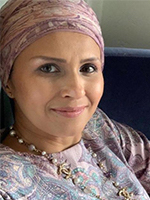 Ms Sharifah Najwa Syed Abu Bakar
Ms Sharifah Najwa Syed Abu Bakar
Chief Officer
Knowledge Management and Strategy Division
SME Corporation Malaysia Mr Manzur Rahman
Mr Manzur Rahman
Director of Marketing, Customer Experience and Innovation,
Axiata Digital Capital Sdn Bhd (ASPIRASI)
12:15 - 12:25 : Closing Remarks
 Mr Herizal Hazri
Mr Herizal Hazri
Chief Executive, Institute of Strategic and International Studies (ISIS);
Chair, Malaysia National Committee for Pacific Economic Cooperation
(MANPEC)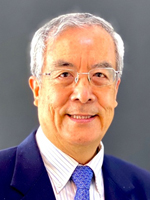 Ambassador Su Ge
Ambassador Su Ge
Co-Chair, Pacific Economic Cooperation Council (PECC);
Chair, China National Committee for Pacific Economic Cooperation (CNCPEC)
Photo Gallery (Day 2)
Recording of the 27th PECC General Meeting (Day 1)
Recording of the 27th PECC General Meeting (Day 2)
Organiser




